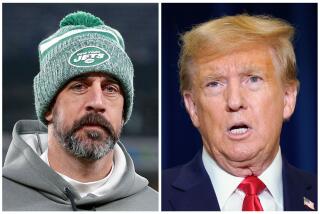Double Jeopardy
- Share via
LAS VEGAS — A London paper called it “the Crime of the Century.”
Roy Jones Jr., ringside as a commentator, said he was “ashamed.”
The howls of protest over last March’s draw between Evander Holyfield and Lennox Lewis echoed from the seats at Madison Square Garden to the offices of the New York state legislature, from the halls of Congress to the pubs of Great Britain.
Investigate the judges, they cried. Incarcerate promoter Don King. Reform this seedy, corrupt sport of boxing, or ban it altogether.
So what happened?
Well, here we are heading for Saturday night, which will be eight months to the day since the Holyfield-Lewis fight for the undisputed heavyweight championship ended in controversy, and all the main characters are back in place ready to do it all over again, this time at Las Vegas’ Thomas & Mack Center.
Lewis is still insisting he won the fight, a view shared by most of those who saw it. Holyfield is still dodging questions about the verdict as deftly as he dodges punches, conceding nothing more than the fact that his performance was sub-par.
And King? He’s still center stage, standing taller than he has since he and Mike Tyson were the unquestioned rulers of the heavyweight division.
HBO officials would have preferred not to have King even associated with this rematch. They wanted him to agree that, if he were indicted in connection with the first fight, he wouldn’t be involved in the second.
Not to worry. The threatened legal action never turned into more than that.
In the meantime, King won a huge victory in the ring in September when his fighter, Felix Trinidad, beat Oscar De La Hoya, the franchise of King’s archrival, promoter Bob Arum, to give King control of the welterweight division. If Holyfield, also a King fighter, should beat Lewis on Saturday, King would again be the most powerful man in boxing.
Elsewhere, the two judges whose scores were in dispute in the first fight, Eugenia Williams of the United States (115-113 for Holyfield) and Larry O’Connell of Great Britain (115-115), have continued to work. Stanley Christoudoulou of South Africa had Lewis winning, 116-113.
Williams’ work that night, and her subsequent statements, were the most suspicious. Although it could be argued that reasonable judges could disagree on a fight all scored closely, it defied logic to figure that Holyfield won the fifth round, a round Lewis clearly dominated. Yet Williams gave Holyfield that round.
And she lost whatever credibility she had left by later testifying before a New York state senate panel that she had trouble judging the fight because ringside photographers blocked her view. Judges sit on raised seats so that nothing interferes with their line of sight.
Yet despite Williams’ words and performance, and rumors that she had been paid off, no evidence of any wrongdoing was ever presented.
So the uproar was for naught?
Not entirely. Things are changing in boxing for the better, although at a slower pace than many would like.
Bob Lee, president of the International Boxing Federation, and three other members of his organization were indicted last week by a federal grand jury in Newark, N.J., on charges of accepting bribes to fix boxing rankings.
The work of that grand jury had begun long before Holyfield and Lewis stepped into the ring, but the outrage over that fight gave investigators new avenues to follow and new momentum to ride. Williams, who was picked by the IBF to judge Holyfield-Lewis, testified before the Newark grand jury.
The Muhammad Ali Boxing Act, passed by the House of Representatives earlier this week, contains a requirement that all state boxing commissions certify and approve referees and judges. That provision was added after Holyfield-Lewis.
And although no legal action was taken after an investigation of Holyfield-Lewis by state agencies in New York, many expect the shining of such a bright spotlight on the controversy and the continuing probe of the IBF to make it more difficult for those bent on bending the rules of boxing.
The first Holyfield-Lewis fight was a strange match from the beginning. Holyfield, who labored for years to create the image of a humble, religious man, stepped out of character before the fight, becoming a braggart. Lewis’ verbal jabs at Holyfield, calling him a “hypocrite” for representing himself as pious while fathering children out of wedlock, seemed to get to Holyfield.
He announced he would knock Lewis out in the third round, indicating that the prediction came from on high.
As the bell rang to end the third round, and Lewis was still standing, noted boxing historian Bert Sugar remarked, “God just lost.”
Holyfield seemed to sag emotionally after his failed prediction and Lewis appeared to gain strength. He was clearly the better fighter through much of the bout. But, feeling that he was well ahead on points and still cautious against an opponent as dangerous as Holyfield, Lewis was conservative in the final rounds. Rather than going in for the knockout, he was content to lay back and use his height and reach advantage to keep Holyfield at bay.
And that left room for the judges to differ.
They weren’t the only ones to do so. While most of the media had Lewis winning (The Times scored it for him, 116-113) Colin Hart of the London Sun, the paper that labeled the outcome the Crime of the Century, also called it a draw.
“In Britain, there was mass hysteria,” said Hart, a 30-year veteran of the boxing beat who had to face much of that hysteria himself because of his scoring. “There was a lot of chauvinism. People felt that Lewis looked gallant, but that he had been robbed by America in general and Don King in particular. They felt it was the crime of the century. Forget Hitler, Stalin, Pol Pot and all the rest.”
His countrymen accused Hart of being on drugs. They said he should be fired.
O’Connell was forced to leave his home for several days to get away from the verbal abuse.
For Lewis, it was the opposite. In the past, he had never been embraced by his homeland, in part because he had moved to Canada as a young man and now lives in Jamaica. But the outrage changed all that.
“This fight has done him more good than anything else he’s done,” Hart said. “It has put him on the map. He has never been as popular as he is today. It has given him an image. People come up to him now and say, ‘You were robbed.’ They hardly recognized him before.”
Despite a 34-1 record, 27 knockouts and two reigns as a heavyweight champion, Lewis found his recognition not as a winner, but as the victim of the crime of the century.
More to Read
Go beyond the scoreboard
Get the latest on L.A.'s teams in the daily Sports Report newsletter.
You may occasionally receive promotional content from the Los Angeles Times.










